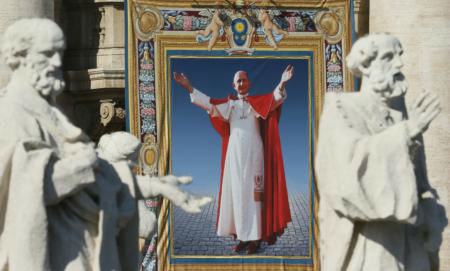Pope Paul VI joins the ranks of the blessed
This past Sunday Pope Francis proclaimed his predecessor Paul VI to be "blessed," which means that he is worthy of imitation, that people can pray to his intercession with God, and that his feast day, Sept. 26 (which is actually his birthday, the day he was born in 1897), can be liturgically celebrated in some places, presumably his home diocese of Brescia in Italy, as well as in Milan, where he was archbishop from 1954-1963, and in Rome itself, where he was pope from 1963 to his death in 1978.
In his extensive biography of Paul VI, the British journalist Peter Hebblethwaite recounts a telling story: "Cardinal Montini's last sermon before the conclave was in the Milanese church (in Rome) of San Carlo in Corso where the heart of St. Charles Borromeo is preserved. His text was John 21:18, 'Truly, truly, Peter, when you were young, you girded yourself and walked where you would; but when you are old, you will stretch out your hands, and another will gird you and carry you where you do not wish to go.' He was not speaking of himself, but of the Petrine office. Yet he was in tears, and so was everyone else. They knew."
I thought of this moment when Pope Francis quoted, in his homily at Sunday's beatification, the entry that Pope Paul made in his personal journal at the end of the Second Vatican Council in 1965: "Perhaps the Lord has called me and preserved me for this service not because I am particularly fit for it, or so that I can govern and rescue the Church from her present difficulties, but so that I can suffer something for the Church, and in that way it will be clear that he (the Lord) and no other, is her guide and savior."
And suffer he did, but with a steadfast and joyful spirit, because he was pope in the crazy and turbulent 60s and 70s, when it seemed at times that the future belonged to those in open and defiant rebellion from authority of whatever sort.
In the face of the sexual revolution, he proclaimed the importance of not separating the loving from the procreative meaning of sexuality in his 1968 encyclical "Humanae Vitae," on the regulation of birth. He also reaffirmed the importance of priestly celibacy for the Latin Church, and reiterated the doctrine of transubstantiation as a way of safeguarding belief in the real presence of Christ in the Holy Eucharist, at a time when widespread liturgical experimentation worked against a sense of the sacred and transcendent.
As Pope Francis said on Sunday, "In this humility the greatness of Blessed Paul VI shines forth: before the advent of a secularized and hostile society, he could hold fast, with farsightedness and wisdom, and at times alone--to the helm of the barque of Peter, while never losing his joy and his trust in the Lord."
He brought the Second Vatican Council to a successful conclusion. Among other things, the Council solemnly proclaimed the universal call to holiness in the Dogmatic Constitution on the Church "Lumen Gentium," a teaching that he declared in 1969, "is considered the most characteristic element of the entire teaching of the Council and, as it were, its ultimate purpose." His beatification means that he actually practiced what he preached, that he walked the talk.
Two other beatifications of the past month shed some light on this. One, on Oct. 3 in Newark, N.J., of Blessed Miriam Teresa Demjanovich, an American Sister of Charity who died in 1927 in her 20s. She wrote movingly that "Union with God is the spiritual height God calls everyone to achieve -- 'any one,' not only religious, but 'any one' who chooses, who wills to seek this pearl of great price, who specializes in the traffic of eternal goods, who says 'yes' constantly to God the Holy Ghost."
The other was the beatification, at which I was fortunate enough to be present, on Sept. 27 in Madrid of Blessed Alvaro del Portillo, first prelate of Opus Dei and successor to St. Josemaria, its founder. Opus Dei, to which I belong, has the mission of spreading the search for holiness through ordinary life. Blessed Alvaro met with Blessed Paul VI in 1976 and told the pope that the founder taught him to offer his daily Mass for the Church and the Roman Pontiff. Paul VI, moved, insisted that he pray only for the Church. Blessed Alvaro in reply told him respectfully, "Holiness, I cannot separate the Head from the Body. I can't pray for the Church without asking at the same time for the visible Head of the Church, the successor of St. Peter. The pope insisted, 'No, no. Pray for the Church, for the Church.' I insisted: Your Holiness just told me to be very faithful to the spirit of our founder ... I am faithful to his example and obey also in this Your Holiness. Then he answered me: 'Good, do as you wish.'" (Hugo de Azevedo, "Mision Cumplida: Mons. Alvaro del Portillo")
In his humility, Blessed Paul VI would not ask for prayers for his person. Pope Francis, on the other hand, never stops asking for prayers. The takeaway: become a saint and remember to pray for the Church and the pope.
Dwight G. Duncan is professor at UMass School of Law Dartmouth. He holds degrees in both civil and canon law.
- Dwight G. Duncan is professor at UMass School of Law Dartmouth. He holds degrees in both civil and canon law.



















